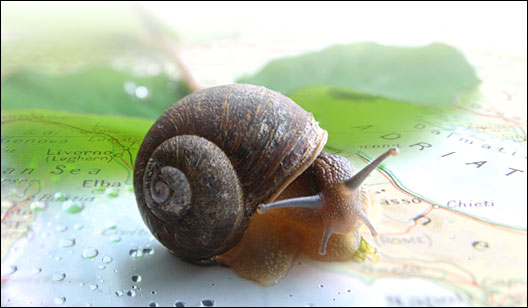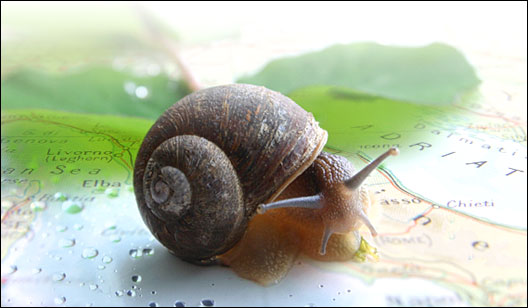
After days of feasts — intellectual, social, and culinary — my mind is too scrambled to put together a more structured column. Instead, here are some impressions and observations from Terra Madre while they are still fresh, written on a train ride between Turin and Florence. There is more to report; look for additional blog posts next week.
The Real Economy: The Economy of the Land
“We are the world’s largest multinational,” declared Carlo Petrini. He was addressing an international crowd of 7,000 food producers, chefs, and activists at Slow Food’s biennial gathering in Turin.
The scene had the feel of a United Nations confab. We were assembled in an arena built for the 2006 Winter Olympics. Everyone wore headphones tuned to simultaneous translations in one of eight languages. From where I sat in the nosebleed seats (floor seating was reserved for delegates — no press allowed), Petrini cut a tiny figure, gesturing expansively as he spoke. But there were several giant television screens suspended high above the crowd, from which I could see the puckish twinkle in his eye as he made his points.
Petrini and his comrades started Slow Food in 1986, aghast at the idea of a McDonald’s opening just below Rome’s Spanish Steps. They declared a universal “right to flavor” and set themselves the task of defending the diversity of global foodways against encroaching homogenization.
By “largest multinational,” Petrini must have meant the global network of “food communities” represented by (but not encompassed by) Slow Food — and not the organization itself. Amid news of accelerating global financial turmoil, the remark resonated. “The economy of financial wizardry, the spectral economy, is collapsing before us,” he declared. “You are the real economy — the economy of the land.” The crowd erupted into applause.
I’ve heard Petrini speak several times now, and read at his book, Slow Food Nation: Why Our Food Should Be Good, Clean, and Fair. He’s a charming but at times maddeningly impressionistic, unstructured thinker. He often expresses himself in florid, elaborate metaphors that seem to go nowhere. He’s full of declarations of what “must” happen (we must ensure that food producers receive a fair price, etc.), but light on ideas of how to make things happen. I often find his liberal use of words like “good” and “virtuous” reductive and vaguely defined.
But at this particular speech, I felt like I got Petrini. He brings people together. He creates a sense of community among broadly diverse factions. In the United States and Europe, Slow Food struggles with a reputation for elitism, fending off charges that it’s a food-and-wine club whose events price out all but the well-to-do. To be sure, America’s wealth was demonstrated by the huge contingent of delegates, numbering some 800 (more than any other nation besides Italy itself). But Petrini assembled at Terra Madre an impressive display of cultural diversity: food artisans and smallholder farmers fighting to protect traditional livelihoods, alongside North American back-to-the-landers striving to revive lost traditions and establish new ones. These were elites, to be sure, only not of the Nieman Marcus variety.
A trip through the thicket of Petrini’s metaphors often enough leads to a kind of visionary poetry. He works his magic both among the globe’s far-flung food producers, and also between producers and consumers. (His act sometimes falls flat — as it did in an ill-starred trip to San Francisco in 2007.)
I also felt like I understood Slow Food a little more than I had in the past. Its representatives, including Petrini, sometimes confuse the organization itself with the loose, hydra-headed movement to challenge the hegemony of globalized, corporate-controlled, industrial food. Slow Food does not embody the movement — but it forms a valuable part. It is in many ways a high-end dining club, but it’s also more than that. At its best, it foments solidarity between the various activists, producers, and consumers across the globe working to create on-the-ground alternatives to industrial food. It also provides a vital public platform for cogent, sharp-edged critics of the food system like Vandana Shiva.
Slow Food USA: Social Justice on the Menu
“If you haven’t noticed yet, Slow Food is about to get political!” announced Erika Lesser, executive director of Slow Food USA. She was addressing the Slow Food USA chapter — for one day, Terra Madre had broken into meetings of regional and national contingents.
Few could have missed the political turn. Unlike many Slow Food USA events I’ve been to, there were few or no odes to the transformative power of a perfect peach. Here, speakers focused on how to broaden access to healthy, ecologically raised food.
Josh Viertel, Slow Food USA’s new president, set the tone. He announced that the organization would from now forward pursue two main priorities: youth organizing and social justice. “Our food system disproportionately hurts poor people and people of color, and alternatives aren’t accessible to those groups,” he said.
He said that in the past, the group had focused its rhetoric on values: commitment to “good, clean, and fair food,” for example. From now on, it would emphasize rights. “Access to good, clean, and fair food is not a privilege,” he declared. “It’s a right, and we have to make that clear.” That message, he insisted, was the most important one that delegates could bring back to their communities.
He also vowed that Slow Food USA would work to avoid doing something it has been accused of doing in the past: suck the air out the sustainable-food movement by hoarding resources and media attention at the expense of social-justice activists.
As if to demonstrate Viertel’s vision, an impressive array of U.S. farmers and food-justice activists took the floor. Representatives of the Coalition of Immokalee Workers gave a brief, hard-hitting take on the dire state of labor conditions in industrial-vegetable farm fields (and increasingly, large-scale organic fields). Ian Marvy, founder and executive director of Added Value (here’s a feature I did on them a couple of years ago), also spoke inspiringly. His group operates a variety of youth-oriented food programs in a Brooklyn neighborhood whose median wage lies well below the poverty line, including a CSA and farmers market fed by a three-acre neighborhood farm.
But Will Allen and his daughter Erika of Growing Power stole the show. Growing Power brings healthy food, much of it grown on inner-city farms and garden plots, into low-income neighborhoods in Chicago and Milwaukee. The Allens are widely hailed for their highly productive farming techniques, which range from worm-based composting to aquaculture, as well as for creating skilled, responsible jobs for inner-city youth. Still basking in the glow of his recently announced MacArthur Foundation “genius” award, Will Allen pointed out that economic collapse in inner-city areas had left behind food deserts and exposed people “to the worst kind of food possible and a level of everyday violence that few of you have ever experienced.”
Joining the effort to rebuild healthy food economies in such areas is a responsibility for more-privileged people, he said. He added: “I’m glad to see that Slow Food is beginning to accept that responsibility.”
Erika Allen wrapped up with a challenge: “How are you fighting racism in your food community?”


